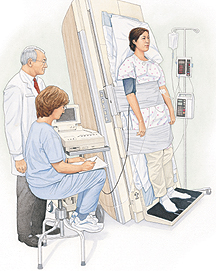Tilt Table Testing
Tilt table testing is a simple test that helps the doctor pinpoint the cause of your fainting. It checks how changes in body position can affect your blood pressure. To do this, you are placed on a table that is tilted upward. The test tries to recreate fainting symptoms while your blood pressure and heart rate are monitored. The test can be done in a hospital or at your doctor's office.
Before Your Test
Try to arrive 15 minutes early for your appointment. This will allow time to check in. For best results, prepare for the test as directed. Keep in mind:
-
When you schedule the test, be sure to mention all the medications you take. Ask if you should stop taking any of them the day of the test.
-
A few days ahead, arrange for a ride home after the test.
-
After the midnight before the test, don't eat or drink anything.
-
On the day of the test, dress for ease and comfort. Wear a two-piece outfit, top and bottoms. You will need to undress from the waist up and put on a short hospital gown.

You will be monitored by your healthcare team through the entire test.
Tilt table testing takes about 60 minutes. The testing room is kept quiet and dimly lit. During the test:
-
Small pads (electrodes) are put on your chest to monitor your heartbeat.
-
A blood pressure cuff is put on your arm.
-
An IV (intravenous) line may be placed in your other arm. The IV line delivers fluids.
-
You'll be asked to lie flat on the table. Your upper body and thighs will be held in place with straps.
-
The table tilts until you are almost standing upright.
-
You'll remain upright for up to 60 minutes. In most cases, the test is over in 30-45 minutes.
-
Occasionally, people are given certain medications and retested. These medications may make you feel shaky.
After Your Test
Any medications used during the test should leave your system within 15 minutes. If you were told to skip daily medications before the test, ask if you should start taking them again. You're likely to be sent home right away. It's a good idea to have a friend or family member drive. If you fainted during the test, you may want to rest for a few hours once you're home.
Report Any Symptoms You Have During the Test
![]() (727) 259-7818
(727) 259-7818